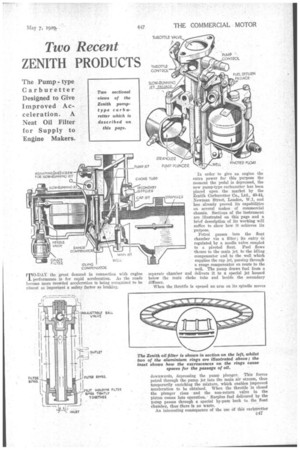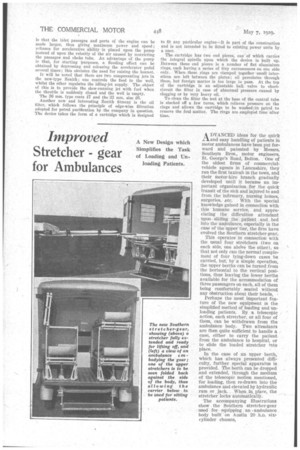Two Recent ZENITH PRODUCTS
Page 79

Page 80

If you've noticed an error in this article please click here to report it so we can fix it.
The Pumptype Carburetter Designed to Give Improved Acceleration. A Neat Oil Filter for Supply to Engine Makers.
1110-DAY the great demand in connection with engine separate chamber 1 performance is for rapid acceleration. As the roads below the main become MOTO crowded acceleration is being recognized to be diffuser. In order to give an engine the extra power for this purpose themoment the pedal is depressed, the new pump-type carburetter has been placed upon the market by the Zenith Carburetter Co., Ltd., 40-44, Newman Street London, W.1, and has already proved its capabilities onseveral makes of commercial chassis. Sections of the instrument are illustrated on this page and a brief description of its working will suffice to show how it achieves its purpose.
Petrol passes into the float chamber via a filter; its entry .4s regulated. by a needle valve coupled to a pivoted float. Fuel flows -thence to the main jet. to the idling compensator and to the well which supplies the cap jet, passing through a range compensator en route to the well. The pump draws fuel from a and delivers it to a special jet housed choke tube and beside the secondary
The Zenith oil filter is shown in section on the left, whilst two of the aluminium rings are illustrated above ; the inset shows how the excrescences on the rings cause spaces for the passage of oil.
downwards, depressing the pump plunger. This forces petrol through the pump jet into the main air stream, thus temporarily enriching the mixture, which enables improved acceleration to be obtained, When the throttle is closed the plunger rises and the non-return valve in the piston comes into operation. ' Surplus fuel delivered by the pump passes through a special by-pass back to the float chamber, thus there is no waste. An interesting consequence of the use Of this carburetter C47 is that• the inlet passages and ports of the engine can be made larger, thus giving maximum power and speed; reliance for accelerative ability is placed upon the pump instead of upon the velocity of the air caused by restricting the passages and choke tube. An advantage of the pump is that, for starting purposes, a flooding effect can be obtained by depressing and releasing the accelerator pedal several times; this obviates the need for raising the bonnet. It will be noted that there are two compensating jets in the new-type Zenith; one controls the feed to the well, whilst the other regulates the idling-jet supply. The object of this is to provide the slow-running jet with fuel when the throttle is suddenly closed and the well is empty.
The 36 mm. type costs £7 and the 33 mm. size £6.
Another new and interesting Zenith fitment is the oil filter, which follows the principle of edge-wise filtration adopted for petrol purification by the company in question. The device takes the form of a cartridge which is designed to fit any particular engine—it is part of the construction and is not intended to be fitted to existing power units by a user.
The cartridge has two end pieces, one' of which carries the integral spindle upon which the device is built up. Between these end pieces is a number of fiat aluminium rings, each having a series of tiny excrescences on Oliie side only. When these rings are clamped together small•interstices are left betweeu the plates ; oil percolates through these, but foreign matter is too large to pass. At the top of the cartridge is an adjustable ball valve to shortcircuit the filter in case of abnormal pressure caused by clogging or by very heavy oil.
To clean the filter the But at the base of the central tube is slacked off a few turns, which relieves pressure on the rings and allows the cartridge to be washed..in petrol to remove the foul matter. The rings are employed time after time.






























































































































